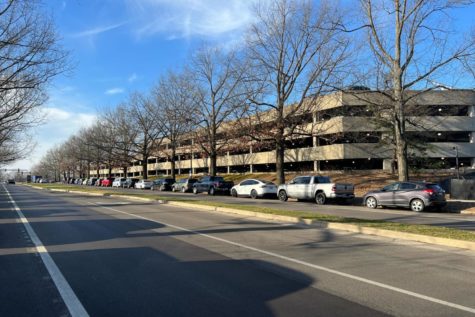Consider campus like a micro-city. To a passionate urbanist, it would be a paradise — interlocked structures with residence, retail, food service and public goods mingling in open air.
The every necessity of the student is met with only a 15-minute walk or an even briefer ride on the robust public transit system. I might not like to live here forever, but if not for the physical structure of a campus like this, none of us may reflect so fondly upon our time here.
And like any other city, the University of Kentucky is growing rapidly. We’re welcoming more new students than we ever have and having just as much trouble housing their cars as we are them.
Campus, and the surrounding areas, are already littered with hideous asphalt prairies, yet it just doesn’t seem to be enough. Parking is too expensive! Parking is too inaccessible! I fear we are but one more record-breaking freshman class from hearing cries of “give me parking or give me death!”
But as this problem permeates throughout campus, it seems like many students are missing the point. Some cite concerns with intense ticketing (the only mechanism which prevents hogging temporary spots for too long).
Others argue parking fees should be included in the price of tuition. Besides the obvious inequalities with forcing students to fund the storage of those lucky enough to own a car, the issue on students’ minds doesn’t seem to be “How are we going to efficiently and fairly transport students?” but rather “Where is the next lot going to be?”
If it seems like I’m making the hard-fought case against parking, I am. Our national obsession with parking is a blight, infecting now even our schools. The environmental impacts are well documented — sprawling ground lots not only eat into very necessary greenspace, but the larger car-dependence is fueling the climate crisis.
Transportation, personal and industrial, is responsible for about 38% of national emissions, the largest chunk from any single sector, according to the Congressional Budget Office.
An abundance of parking — especially on the street — is also a public safety concern. For pedestrians, cars parked along the street obstruct the view of the street and increase incident rates. For motorists, street-parked cars can obstruct views or disrupt the flow of traffic and cause collisions.

Off campus, the parking craze hinders new housing starts and prevents walkable and affordable neighborhoods from being built. Restrictions like parking minimums on new housing units and the profitability of on-ground lots makes combating rising housing prices incredibly hard.
Building more lots would be easy, but clunky and problematic. There’s no need to create incentives for more cars on campus, and certainly there are better uses for that space, like student housing.
My advice for students: leave your car at home, especially if you live on or near campus. Downtown Lexington is, against all odds, walkable and easy to navigate without a car.
Of course, for some students who require regular trips back home or have no choice but to commute, parking is a necessity. But it should be reserved for those cases primarily and not touted as an amenity.
The university has a role to play in this as well. For as walkable as it is, the bus system is inefficient and overworked. Money that would be invested into parking solutions could be reallocated into improving public transit for students.
This is a school that prides itself on being at the forefront of innovation in the Commonwealth; there is no reason to remain caught up in the old ways of thinking about transportation solutions. The path forward has absolutely nothing to do with cars and absolutely everything to do with constructing a cohesive and inviting ecosystem.
But UK will of course do what it does best: build more structures. The latest budget includes $60 million to expand parking garage #8 by some 700 spaces, $1.5 million for general upkeep and another $8 million renovate parking garage #2. There does not seem to be any planned investment into expanding the school’s partnership with LexTran.
Dissatisfied, I scoured the LexTran budget, which reveals that 7% of its revenue comes from its partnership with UK, but no dice on improving campus buses. Perhaps there is some information I’m missing; if so, please let me know.
The university’s obsession with parking mirrors a nationwide problem. I recall only earlier this year when the entire city of Lexington entered a collective panic when LexPark announced it was raising on-street parking rates by less than a dollar.
We can break out of this funk without altogether forcing students out of their cars. But they sure shouldn’t be made to feel like they need one, neither should it be made so easy to have on that it would be foolish not to.
My advice for the university administration: be a good community partner and think outside the box about this issue. The student automobile doesn’t need to become obsolete, but it shouldn’t be a necessity.
This isn’t just a campus issue, but UK plays a considerable role as the city’s largest employer in steering Lexington’s development. Where UK goes, Lexington will follow; in the matter of parking, we should take that responsibility incredibly seriously.
































































































































































